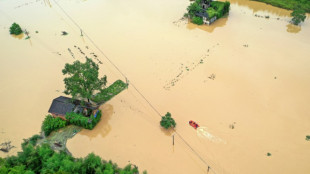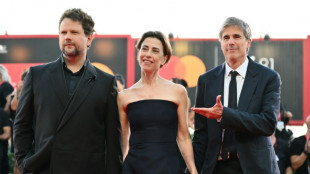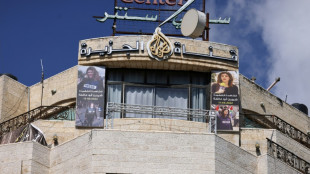
-
 Electric cars took 89% of Norway market in 2024
Electric cars took 89% of Norway market in 2024
-
Rival South Korea camps face off as president holds out

-
 French downhill ace Sarrazin out of intensive care
French downhill ace Sarrazin out of intensive care
-
Djokovic cruises past Monfils as rising stars impress in Brisbane

-
 Montenegro mourns after gunman kills 12
Montenegro mourns after gunman kills 12
-
Sales surge in 2024 for Chinese EV giant BYD

-
 Agnes Keleti, world's oldest Olympic champion, dies at 103
Agnes Keleti, world's oldest Olympic champion, dies at 103
-
Andreeva, Mpetshi Perricard showcase Australian Open potential

-
 Afghan refugees suffer 'like prisoners' in Pakistan crackdown
Afghan refugees suffer 'like prisoners' in Pakistan crackdown
-
Coach tight-lipped on whether Rohit will play in final Australia Test

-
 Blooming hard: Taiwan's persimmon growers struggle
Blooming hard: Taiwan's persimmon growers struggle
-
South Korea's impeached president resists arrest over martial law bid

-
 Knicks roll to ninth straight NBA win, Ivey hurt in Pistons victory
Knicks roll to ninth straight NBA win, Ivey hurt in Pistons victory
-
'Numb' New Orleans grapples with horror of deadly truck attack

-
 Asia stocks begin year on cautious note
Asia stocks begin year on cautious note
-
FBI probes 'terrorist' links in New Orleans truck-ramming that killed 15

-
 2024 was China's hottest year on record: weather agency
2024 was China's hottest year on record: weather agency
-
Perera smashes 46-ball ton as Sri Lanka pile up 218-5 in 3rd NZ T20

-
 South Korea police raid Muan airport over Jeju Air crash that killed 179
South Korea police raid Muan airport over Jeju Air crash that killed 179
-
South Korea's Yoon resists arrest over martial law bid

-
 Sainz set to step out of comfort zone to defend Dakar Rally title
Sainz set to step out of comfort zone to defend Dakar Rally title
-
New Year's fireworks accidents kill five in Germany

-
 'I'm Still Here': an ode to Brazil resistance
'I'm Still Here': an ode to Brazil resistance
-
New Orleans attack suspect was US-born army veteran

-
 Australia axe Marsh, call-up Webster for fifth India Test
Australia axe Marsh, call-up Webster for fifth India Test
-
Jets quarterback Rodgers ponders NFL future ahead of season finale

-
 Eagles' Barkley likely to sit out season finale, ending rushing record bid
Eagles' Barkley likely to sit out season finale, ending rushing record bid
-
Syria FM hopes first foreign visit to Saudi opens 'new, bright page'

-
 At least 10 dead in Montenegro restaurant shooting: minister
At least 10 dead in Montenegro restaurant shooting: minister
-
Arteta reveals Arsenal hit by virus before vital win at Brentford

-
 Palestinian Authority suspends Al Jazeera broadcasts
Palestinian Authority suspends Al Jazeera broadcasts
-
Arsenal close gap on Liverpool as Jesus stars again

-
 Witnesses describe 'war zone' left in wake of New Orleans attack
Witnesses describe 'war zone' left in wake of New Orleans attack
-
Cosmetic surgery aficionado Jocelyne Wildenstein dies aged 79: partner

-
 Tschofenig takes overall Four Hills lead after second leg win
Tschofenig takes overall Four Hills lead after second leg win
-
10 killed in New Year's truck ramming in New Orleans, dozens hurt

-
 Leeds and Burnley held to draws as Windass hits Wednesday wonder strike
Leeds and Burnley held to draws as Windass hits Wednesday wonder strike
-
New Orleans truck attack: what we know so far

-
 Saudi executes at least 338 people in 2024: AFP tally
Saudi executes at least 338 people in 2024: AFP tally
-
Migrants crossing Channel to UK in 2024 soar by 25 percent

-
 Power restored to most of Puerto Rico: utility
Power restored to most of Puerto Rico: utility
-
Seko Fofana joins Rennes after Saudi Arabia stint

-
 Brazil's Amazon saw highest number of fires in 17 years: agency
Brazil's Amazon saw highest number of fires in 17 years: agency
-
McGregor wants no let-up as Celtic aim to maintain Old Firm grip

-
 Truck ramming kills 10 New Year's revelers in New Orleans, injures dozens
Truck ramming kills 10 New Year's revelers in New Orleans, injures dozens
-
Ten dead as man drives truck into New Year crowd in New Orleans

-
 Gaza rescuers say 15 killed in Israeli New Year strike
Gaza rescuers say 15 killed in Israeli New Year strike
-
Rugby chief backs 'trailblazer' Maher to fuel Women's World Cup fever

-
 Right-wing YouTubers back South Korea president's last stand
Right-wing YouTubers back South Korea president's last stand
-
Championship side Stoke appoint Robins as new manager


Jimmy Carter, a transformative diplomat despite Iran
Jimmy Carter's critics turned his name into a synonym for weakness over the Iranian hostage crisis. But by any measure, he also scored major achievements on the world stage through his mix of moralism and painstaking personal diplomacy.
The 39th president of the United States, who died at age 100 on Sunday, transformed the Middle East by brokering the Camp David Accords, which established an enduring and once inconceivable peace between Israel and its most serious adversary at the time, Egypt.
Carter again brought a sense of righteousness and nearly obsessive attention to detail to negotiate the return of the Panama Canal to Panama, defying furor by US conservatives.
In two decisions with lengthy reverberations, Carter followed up on Richard Nixon's opening by recognizing communist China, and he began arming jihadists in Afghanistan who fought back against the Soviet Union, which would collapse a decade later.
But Carter was crushed by Ronald Reagan in the 1980 election in no small part due to foreign affairs after religious hard-liners toppled Iran's shah and seized US embassy staff, whose 444 days in captivity were broadcast nightly on US television.
Carter ordered an aborted rescue mission in which eight US troops died in a helicopter crash.
Asked at a 2015 news conference about his biggest regret, Carter replied: "I wish I'd sent one more helicopter to get the hostages -- and we would have rescued them and I would have been reelected."
- Nagging 'weak' attack -
The Iran debacle led to attacks that Carter was "weak," an image he would struggle to shake off as Republicans cast him as the archetypal contrast to their muscular brand of foreign policy.
The former peanut farmer's public persona did little to help, from a widely panned speech pleading for shared sacrifice to an incident that went the pre-internet version of viral in which Carter shooed away a confrontational rabbit from his fishing boat.
Robert Strong, a professor at Washington and Lee University who wrote a book on Carter's foreign policy, said the late president had been inept in public relations by allowing the "weak" label to stick.
"The people who worked with Carter said exactly the opposite -- he was stubborn, fiercely independent and anything but weak," Strong said.
"That doesn't mean he was always right, but he wasn't someone who held his finger in the wind allowing whatever the current opinion was to win."
Strong said that Carter defied his political advisors and even his wife Rosalynn by pushing quickly on the Panama Canal, convinced of the injustice of the 1903 treaty that gave the meddlesome United States the zone in perpetuity.
"Every president says, 'I don't care about public opinion, I'll really do what's right,'" Strong said.
"Most of the time when they say that, it's not true. To a surprising extent with Carter, it was true."
- Carter and Iran -
Carter, a devout Christian, vowed to elevate human rights after the cold realpolitik of Nixon and Henry Kissinger.
Years after the fact, he could name political prisoners freed following his intervention in their cases, and took pride in coaxing the Soviet Union to let thousands of Jewish citizens emigrate.
But the rights focus came to a head on Iran when Shah Mohammad Reza Pahlavi -- a Western ally whose autocratic rule by decree brought economic and social modernization -- faced growing discontent.
Reflecting debate throughout the administration, Zbigniew Brzezinski, Carter's more hawkish national security advisor, believed the shah should crush the protests -- a time-tested model in the Middle East.
Secretary of state Cyrus Vance, who would later quit in opposition to the ill-fated helicopter raid, wanted reforms by the shah.
Stuart Eizenstat, a top adviser to Carter, acknowledged mistakes on Iran, which the president had called an "island of stability" on a New Year's Eve visit a little more than a year before the revolution that ultimately saw the shah flee the country.
But Eizenstat said Carter could not have known how much the shah had lost support or that he was to die from cancer within months.
"It was the single worst intelligence failure in American history," Eizenstat said in 2018 as he presented a book assessing Carter as a success.
- Peacemaker legacy -
Uniquely among modern US presidents, much of Carter's legacy came after he left the White House. He won the Nobel Peace Prize more than two decades after his defeat at the polls.
The Carter Center, which he established in his home state of Georgia, has championed democracy and global health, observing elections in dozens of countries and virtually eradicating guinea worm, a painful infectious parasite.
Carter also took risks that few others of his stature would. He paid a landmark visit to North Korea in 1994, helping avert conflict, and infuriated Israel by asking if its treatment of the Palestinians constituted "apartheid."
But the accusations of weakness never went away.
Conservative academic William Russell Mead, in a 2010 essay in Foreign Policy magazine, called on then-president Barack Obama to avoid "Carter Syndrome," which he described as "weakness and indecision" and "incoherence and reversals."
Carter personally responded in a letter that listed accomplishments on the Camp David accords, China, the Soviet Union and human rights, while describing the fall of Iran's shah as "obviously unpredictable."
"Although it is true that we did not become involved in military combat during my presidency, I do not consider this a sign of weakness or reason for apology," he wrote.
B.Godinho--PC
